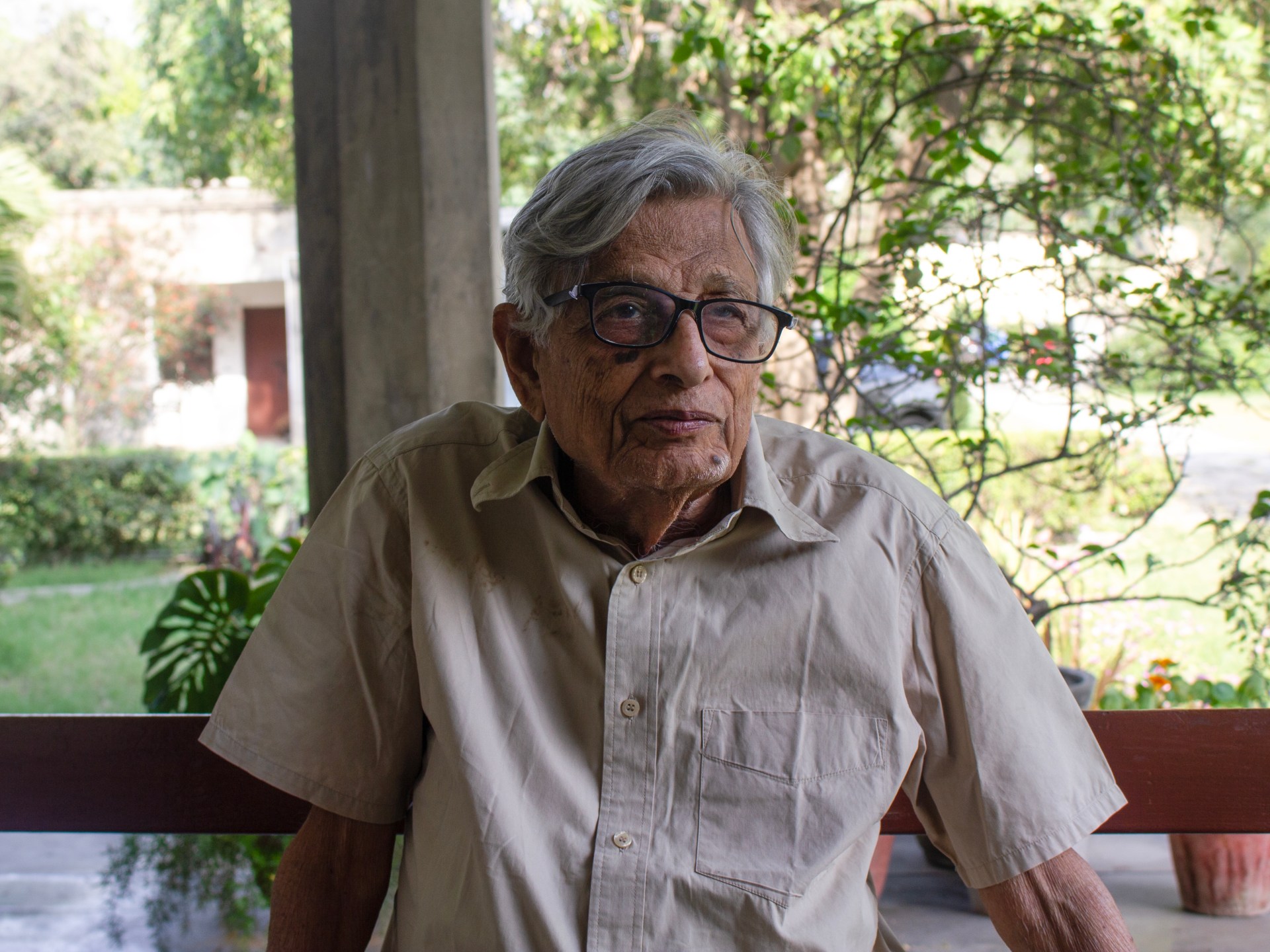World
Rewriting of Indian history anti-Muslim, anti-reason: Irfan Habib

Aligarh, India – India’s Hindu nationalist government has removed chapters on centuries of Muslim rule in the subcontinent, including those of the Mughals, from some school textbooks.
The government, led by the right-wing Bharatiya Janata Party (BJP), has also removed references to the contribution of Muslims in the country’s freedom struggle against the British colonial rulers.
In the textbooks revised by a government-run educational body, ancient India has been glorified, often without the support of historical facts.
Historians say the revision of school textbooks is a part of the BJP’s Islamophobic project to deny Muslims their place in India’s history.
Al Jazeera spoke to historian Irfan Habib, a globally renowned authority on Mughal history, to understand the BJP’s project of rewriting history and the impact it will have on knowledge dissemination in the South Asian country – home to 200 million Muslims.
Al Jazeera: Why is the BJP removing Mughal and other Muslim rulers from school textbooks?
Irfan Habib: Well, it’s not only [about] removing the Mughal rulers. They are actually trying to communalise Indian history by either removing or denigrating Muslims. But this is only one part of the BJP project, the other part is not only omission but myth-building.
Al Jazeera: Can you talk about the recent changes in school textbooks in India?
Habib: In the ancient Indian history syllabus recommended by the UGC [University Grants Commission, the body that governs the universities in India], the caste system is omitted from history. It claims Muslims introduced the caste system during the medieval period.
Every virtue is to be credited to ancient Indian civilisation.
It is not simply bias, but lies and falsehoods are being glorified. This Aryan business is just like the Nazis.
According to the new draft BA [Bachelor of Arts] history syllabus proposed by the UGC, India is supposed to be the original home of the Aryans. It declares that Aryans went from here to civilise the world.
Historians must prove by establishing facts, they can’t manufacture facts. You can’t create an Aryan race. And this is an insult to Sanskrit, because actually in earlier Sanskrit text, Arya is an area in Iran. Iran is plural of Arya. Actually, Iran means [the land of] Aryans.
Now you make Aryans into a race, like Hitler did. Ancient Iranian and Rig Vedic Sanskrit are very close, they are sister languages. Arya means a very respectable and noble person, it doesn’t mean the race. From there onwards, you see it’s not only anti-Muslim, it’s anti-reason.
Al Jazeera: Can you talk about the Indian knowledge system and how it is being now framed by the Hindu far right?
Habib: I recognise that historical sources are such that they can have a Hindu communal interpretation, Muslim communal interpretation, and you can have a Marxist interpretation.
When the Organiser [magazine published by far-right Rashtriya Swayamsevak Sangh (RSS), the BJP’s ideological mentor] published an article saying that Maan Singh built the Taj Mahal, historian Ramesh Chandra Majumdar wrote to them, saying “I won’t read your paper now and you are not entitled to publish any of my articles”. Majumdar came from the Hindu communal school of historians, but nevertheless, he was a professional and did not accept any unproven fact, whether for ancient or medieval India.
Al Jazeera: The Hindu right has always considered the Mughals as outsiders. Now they are also attacking and othering Muslim leaders such as freedom fighter Maulana Abul Kalam Azad and 18th-century ruler Tipu Sultan.
Habib: The exclusion of Azad is anti-Muslim. They don’t want to show that any Muslim was involved in India’s freedom movement.
In case of Tipu Sultan, it is a total reversal of the national issue. Mahatma Gandhi, Jawaharlal Nehru [India’s first prime minister] and others always had very good words for Tipu. The suppression of the Malabar rebellion by Tipu cannot be justified. But that could be said of almost any ruler of that time. But what he did for Mysore and modernisation of its economy, and his battle against the British colonialists cannot be set aside. I should point out that the Indian History Congress in 1999 published three volumes on Tipu. So, Indian historians are not in agreement with the BJP.
Al Jazeera: Names of cities and roads with Muslim names are being erased. How will it impact public memory about Muslims and their historical heritage?
Habib: They want to destroy public memory. Aurangabad’s original name was Khirki and it was again founded by Muslim Malik Ambar, an African. So Malik Ambar is an outsider because he is an African and he is also a Muslim, hence he can’t be named. You can’t call it Ambarnagar which you should if you are interested in history or you should call it Khirki. But Sambhajinagar [Aurangabad’s new name] makes no sense because Sambhaji never went to Aurangabad.
Taj Mahal is a dollar earner. But they silently promote the popular perception that Taj Mahal was originally a Shaivite temple. The English [colonial rulers] in order to protect the Taj from lightning put up a conductor. Now the BJP and its supporters call the conductor a Trishul [trident, a holy Hindu symbol]. It is this kind of popular misperception that they are making.
Al Jazeera: Why does the BJP want to rewrite history? The project has two aspects: the demonisation of the Mughals and the glorification of the Hindu past. Can you elaborate on that?
Habib: Their aim is to demonise Muslims, including the Mughals. You see, they have a number of problems. Let me spell them out for you. The word Hindu is Arabic. Why don’t they first throw it out? Religion itself is a Semitic concept brought to India, now they [BJP] are trying to shape Hinduism according to it.
In fact, there is no use of the word Hindu in Sanskrit literature until the 14-15th century. And even the Vijayanagar emperors called themselves Hindu Rai Suratran, that is Sultan over Hindu Rai. This is very interesting how the words developed. But here you can see that you are applying to Indian religious history concepts that have come from Islam.
They are applying fantasies like India being the mother of democracy. No historian has admitted that India was the mother of democracy. Rig Veda talks about Rajas, which means tribal chief. Yes, you find mention of democracy in ancient Greece and Rome but never find it in India, you never find it in China, you don’t find it in Iran. I say show me a serious historian of ancient India who has said so.
The Sanskrit name for that period is Mahajanpada, which doesn’t mean democratic republic. It means tribes. No serious historian that I have read – communal or otherwise – ever claimed there was democracy in ancient India. Removing caste system from ancient India is totally denying history.
Al Jazeera: The BJP says historical wrongs are being set right. What was wrong in the textbooks? Critics say myths are being pushed as history. As a historian, what do you say to that?
Habib: You see, I can give one example of the Ahoms of Assam. Now if you look at the speeches on Ahoms by [India’s] Home Minister Amit Shah and Assam Chief Minister Himanta Biswa Sarma, they present the Ahom as the greatest nationalist and the Mughals as foreigners. But they forget that Ahom language is Thai language, that their descendants have started calling themselves Thai Ahoms. Today they are both Hindus and Muslims. They were obviously Thai, they were not Hindu.
So you are revising not only history but also creating myths. And if they say they drove out the Mughals, they forget that in 1679, Guwahati ultimately fell to the Mughals. Just to celebrate Ahom who was as foreign as Mughals, or as Indian as Mughals, because they both came from foreign lands. How much would you lose if Mughals are driven out of Indian history? Taj Mahal will be out, Red Fort will be out and the earliest statistical work in the world – Ain-i-Akbari – will be out.
They are applying fantasies like India being the mother of democracy. No historian has admitted India was the mother of democracy.
Al Jazeera: What will be the impact on India’s education system and society as the state monopolises knowledge production with a clear anti-minority bias?
Habib: It is not simply bias, but lies and falsehoods are being glorified. This Aryan business is just like the Nazis. What if you are an Aryan? How do you get bigger and nobler if you are an Aryan? Claiming Indus Valley Civilisation as Sanskrit and calling it Saraswati is absurd. Taj Mahal is an asset, but you are driving it out of your history.
Al Jazeera: Do you think the BJP is mirroring the 1930s’ Nazi Germany in terms of propaganda and revision of history?
Habib: Well, actually MS Golwalkar [RSS leader] praised the Nazis. Certainly, the RSS founders were greatly influenced. In the 1970s, Golwalkar praised Hitler’s treatment of the Jews whatever they might now say about Israel.
Al Jazeera: The Hindu right wing says there was a mass conversion of Hindus under the Mughals and other Muslim rulers. Muslim rulers are also accused of destroying temples. They call it a dark period of history. How do you respond to that?
Habib: This is actually quite absurd. You see when Hajjaj ibn Yusuf sent Mohammed Bin Qasim to Sindh [in the eighth century], he asked him to treat the Hindus as they were treating the Christians and the Parsis, that is to say: be tolerant. Mohammed Bin Qasim did not destroy any temple. In fact, the Multan temple was destroyed by the heretics. So they present a totally wrong picture.
Now I can perhaps say that Hajjaj’s policy was not driven by any great religious spirit of tolerance but simply by practical sense. If you invade a country, you don’t antagonise all of its people. Multani merchants were greatly promoted by Muslim rulers and of course Mughals had very large components of Hindu officials. An ordinary Muslim had little chance to go up the ladder. The first finance minister of Aurangzeb was a Hindu, his greatest officer viceroy was Raja Jay Singh of the Deccan. Of course, the Mughals were not democrats, but neither they were out to convert people by force.
The best thing is that if you read European accounts of India during Aurangzeb’s time, they say that every religion was permitted – you can go to a temple, you can go to a mosque, you can go to a church. There was no parallel in Europe like this or in the Islamic world.
If you refer to Persian sources, then the picture is very different, although I would argue that the English translation, which are also available, are often misleading. One can’t deny facts that temples were destroyed. Nobody defends Aurangzeb’s discriminating measures but at the same time, it will be wrong if you do not compare India’s position with other countries where religious tolerance was not there. If you compare with the other countries [in 18th century], Aurangzeb’s India looked tolerant.

World
Video: South Korea’s Political Instability Deepens With New Impeachment

Lawmakers from South Korea’s governing party protested on Friday against a vote to impeach the country’s acting president, Han Duck-soo. The motion, which passed 192-0, came less than two weeks after President Yoon Suk Yeol was also ousted by the opposition in the National Assembly.
World
Man on vacation with family goes overboard on Norwegian cruise ship in Bahamas

The frantic search for a Norwegian Cruise Line passenger who went overboard has been called off.
A spokesperson for the cruise line confirmed to Fox News Digital that the 51-year-old went overboard from Norwegian Cruise Line’s Norwegian Epic late Thursday afternoon.
The incident was first noted at approximately 3 p.m. as Norwegian Epic was sailing from Ocho Rios, Jamaica en route to Great Stirrup Cay in the Bahamas.
The passenger was on the cruise with his family, the spokesperson said. The cruise left from Port Canaveral, Florida on Saturday, Dec. 21 and was a seven-night Western Caribbean voyage.
DISNEY CRUISE LINE NO LONGER ACCEPTING PHOTOCOPIES OF GUEST BIRTH CERTIFICATES
The cruise liner Norwegian Jewel built at the ship yard Meyer in Papenburg, northern Germany, goes down the river Ems. (AP Photo/Joerg Sarbach, File)
The cruise line said that authorities were quickly notified and search and rescue efforts were immediately implemented.
SOCIAL MEDIA USERS GET DRAMATIC AFTER CARNIVAL CRUISE SHIP HITS ICE IN ALASKA: ‘TITANIC MOMENT’
“After an extensive search that was unfortunately unsuccessful, the ship was released by the authorities to continue its voyage,” the spokesperson said.

The Norwegian Epic, which was built in 2010 and refurbished in 2020, has 19 decks. (Norwegian Cruise Line)
Norwegian Cruise Line said the passenger’s loved ones on board were “being attended to and supported during this very challenging situation.”
“Our thoughts and prayers are with his loved ones during this difficult time,” the spokesperson added.
The Norwegian Epic, which was built in 2010 and refurbished in 2020, has 19 decks. It can accommodate 4,070 passengers with double occupancy of its cabins and has 1,724 crew members.
It was not immediately clear what caused the man to go overboard. The man has not been identified.
World
Olive oil, milk and cereals: How did food prices fluctuate in 2024?

After food prices soared in 2021 and 2022, over five essential food products saw price drops in 2024, including milk and cereals.
In 2024, agricultural prices in the European Union saw a modest decline, falling by 2% compared to 2023.
This price decline followed sharp increases in 2021 and 2022 that occurred due to the COVID-19 pandemic, extreme weather conditions and Russia’s invasion of Ukraine.
Despite a surge in olive oil prices in 2024, the prices of cereals dropped by 15%, eggs by 8%, and vegetables and horticultural products declined by 2%.
The price of pigs and poultry also shrank by 7% and 8%, respectively.
According to Eurostat figures, milk prices decreased in 16 EU countries in 2024.
The sharpest decline was recorded in Finland with a 12% drop in prices, followed by Portugal with 10% and Spain with 8%.
By contrast, the sharpest increase was in Ireland with a 15% rise in prices, followed by Lithuania with 11% and Latvia with 10%.
In terms of production, the cost of seeds and veterinary services rose by 3%.
However, prices for fertilisers and soil improvers plummeted by 18%, food for animals by 11%, and plant protection products and pesticides by 2%.
Commission measures between farmers and buyers
After a year in which farmers have protested regularly, the EU Commission has presented an initiative to ensure they receive fair compensation and are no longer forced to sell products below production costs.
The proposed measures include mandatory written contracts that require buyers to clearly outline key terms such as price, quantity, and delivery timelines, taking into account market conditions and cost fluctuations.
The package also introduces a regulation to enhance enforcement of the Unfair Trading Practices (UTPs) Directive, which was adopted five years ago but remains largely unimplemented.
Video editor • Mert Can Yilmaz
-
/cdn.vox-cdn.com/uploads/chorus_asset/file/24924653/236780_Google_AntiTrust_Trial_Custom_Art_CVirginia__0003_1.png)
/cdn.vox-cdn.com/uploads/chorus_asset/file/24924653/236780_Google_AntiTrust_Trial_Custom_Art_CVirginia__0003_1.png) Technology7 days ago
Technology7 days agoGoogle’s counteroffer to the government trying to break it up is unbundling Android apps
-

 News1 week ago
News1 week agoNovo Nordisk shares tumble as weight-loss drug trial data disappoints
-

 Politics1 week ago
Politics1 week agoIllegal immigrant sexually abused child in the U.S. after being removed from the country five times
-

 Entertainment1 week ago
Entertainment1 week ago'It's a little holiday gift': Inside the Weeknd's free Santa Monica show for his biggest fans
-

 Lifestyle1 week ago
Lifestyle1 week agoThink you can't dance? Get up and try these tips in our comic. We dare you!
-
/cdn.vox-cdn.com/uploads/chorus_asset/file/25672934/Metaphor_Key_Art_Horizontal.png)
/cdn.vox-cdn.com/uploads/chorus_asset/file/25672934/Metaphor_Key_Art_Horizontal.png) Technology3 days ago
Technology3 days agoThere’s a reason Metaphor: ReFantanzio’s battle music sounds as cool as it does
-

 Technology1 week ago
Technology1 week agoFox News AI Newsletter: OpenAI responds to Elon Musk's lawsuit
-

 News4 days ago
News4 days agoFrance’s new premier selects Eric Lombard as finance minister



















